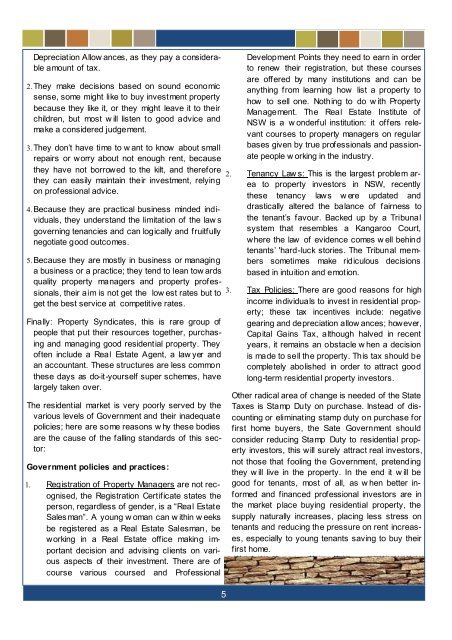You also want an ePaper? Increase the reach of your titles
YUMPU automatically turns print PDFs into web optimized ePapers that Google loves.
Depreciation Allow ances, as they pay a considerable<br />
amount of tax.<br />
2. They make decisions based on sound economic<br />
sense, some might like to buy investment property<br />
because they like it, or they might leave it to their<br />
children, but most w ill listen to good advice and<br />
make a considered judgement.<br />
3. They don’t have time to w ant to know about small<br />
repairs or worry about not enough rent, because<br />
they have not borrowed to the kilt, and therefore<br />
they can easily maintain their investment, relying<br />
on professional advice.<br />
4. Because they are practical business minded individuals,<br />
they understand the limitation of the law s<br />
governing tenancies and can logically and fruitfully<br />
negotiate good outcomes.<br />
5. Because they are mostly in business or managing<br />
a business or a practice; they tend to lean tow ards<br />
quality property managers and property professionals,<br />
their aim is not get the low est rates but to<br />
get the best service at competitive rates.<br />
Finally: Property Syndicates, this is rare group of<br />
people that put their resources together, purchasing<br />
and managing good residential property. They<br />
often include a Real Estate Agent, a law yer and<br />
an accountant. These structures are less common<br />
these days as do-it-yourself super schemes, have<br />
largely taken over.<br />
The residential market is very poorly served by the<br />
various levels of Government and their inadequate<br />
policies; here are some reasons w hy these bodies<br />
are the cause of the falling standards of this sector:<br />
Government policies and practices:<br />
1. Registration of Property Managers are not recognised,<br />
the Registration Certificate states the<br />
person, regardless of gender, is a “Real Estate<br />
Sales man”. A young w oman can w ithin w eeks<br />
be registered as a Real Estate Salesman, be<br />
working in a Real Estate office making important<br />
decision and advising clients on various<br />
aspects of their investment. There are of<br />
course various coursed and Professional<br />
5<br />
Development Points they need to earn in order<br />
to renew their registration, but these courses<br />
are offered by many institutions and can be<br />
anything from learning how list a property to<br />
how to sell one. Nothing to do w ith Property<br />
Management. The Real Estate Institute of<br />
NSW is a w onderful institution: it offers relevant<br />
courses to property managers on regular<br />
bases given by true professionals and passionate<br />
people w orking in the industry.<br />
2. Tenancy Law s: This is the largest problem area<br />
to property investors in NSW, recently<br />
these tenancy laws w ere updated and<br />
drastically altered the balance of fairness to<br />
the tenant’s favour. Backed up by a Tribunal<br />
system that resembles a Kangaroo Court,<br />
where the law of evidence comes w ell behind<br />
tenants’ 'hard-luck stories. The Tribunal members<br />
sometimes make ridiculous decisions<br />
based in intuition and emotion.<br />
3. Tax Policies: There are good reasons for high<br />
income individuals to invest in residential property;<br />
these tax incentives include: negative<br />
gearing and depreciation allow ances; however,<br />
Capital Gains Tax, although halved in recent<br />
years, it remains an obstacle w hen a decision<br />
is made to sell the property. This tax should be<br />
completely abolished in order to attract good<br />
long-term residential property investors.<br />
Other radical area of change is needed of the State<br />
Taxes is Stamp Duty on purchase. Instead of discounting<br />
or eliminating stamp duty on purchase for<br />
first home buyers, the Sate Government should<br />
consider reducing Stamp Duty to residential property<br />
investors, this will surely attract real investors,<br />
not those that fooling the Government, pretending<br />
they w ill live in the property. In the end it w ill be<br />
good for tenants, most of all, as w hen better informed<br />
and financed professional investors are in<br />
the market place buying residential property, the<br />
supply naturally increases, placing less stress on<br />
tenants and reducing the pressure on rent increases,<br />
especially to young tenants saving to buy their<br />
first home.


















